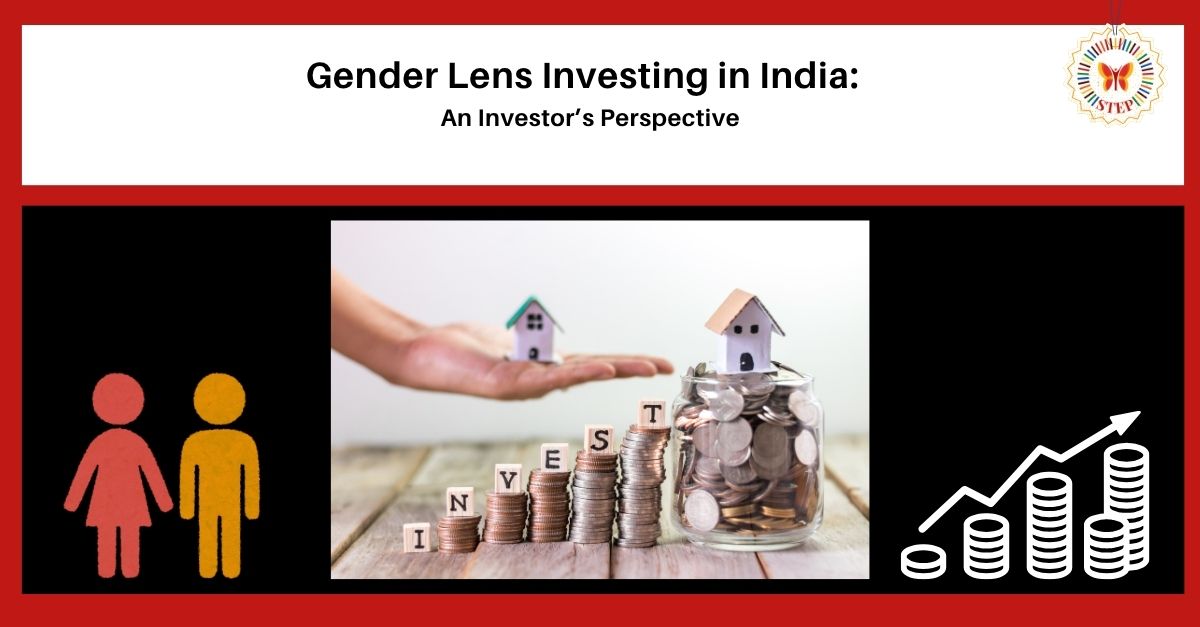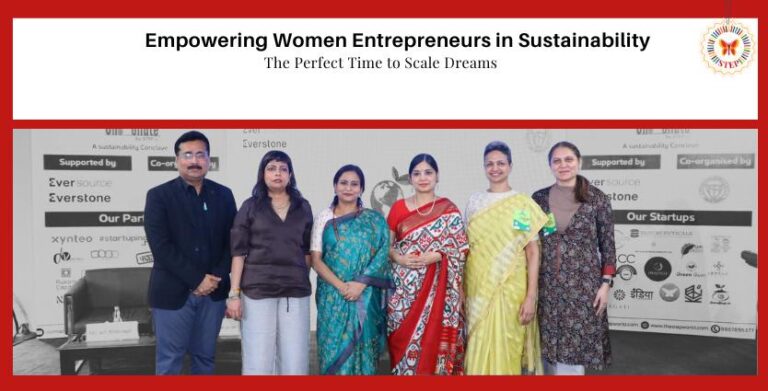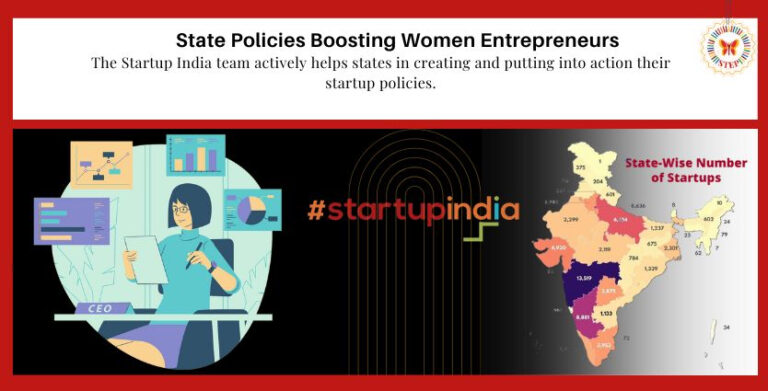Gender Lens Investing in India: An Investor’s Perspective
The fifth STEP Pitchfest 2023 1was held in Delhi this April. The event brought together women entrepreneurs, investors, service providers, and ecosystem enablers to showcase innovative ideas and solutions by women across various industries. The event aimed to provide a platform for women to access funding opportunities, gain valuable feedback from experts, and build meaningful connections within the business community.
We took this opportunity to bring together a panel of experts and investors to understand their practices, views, and vision toward investing in women-led businesses. This approach, called ‘Gender-lens Investing’ seeks to promote gender equality and empower women through capital allocation to companies prioritizing gender diversity and equity. This approach is becoming increasingly important in India, where gender inequality remains a significant challenge. This op-ed briefly summarizes our desk-based research on Gender Lens Investing in India and the panel’s views.
Less than a fifth of Indian start-ups are women-led
Various researches and industry interactions indicate that India faces significant challenges in creating an enabling environment for women’s entrepreneurship. As per government statistics for 2016, while India currently has a massive 8 million women-led businesses, these represent only 14% of this segment of organizations in the country. Further, according to a Nasscom report2, within the startup segment, only 18% of the startups in India are led by at least one woman founder. In fact, India ranked 48 among the 57 countries evaluated under the 2018 Mastercard Index of Women Entrepreneurs. Significant constraints for Indian women entrepreneurs are access to knowledge, networks, and capital due to socially entrenched gender biases in the entrepreneurship ecosystem.
Several global development and investment institutions have shared these concerns, and there have been several efforts to bring this concern to the fore. In this context, the term – Gender Lens Investing – was coined around 2009 and became an increasingly popular practice in the mid-2010s.
As per Stanford Social Review, Gender Lens Investing refers to ‘the deliberate incorporation of gender factors into investment analysis and decisions.’ Three common goals or strategies that underlie gender lens investing3:
• Increasing access to capital for women entrepreneurs,
• Fostering workplace equity,
• Developing products and services that benefit women and girls
The panel discussion focused on the specific aspects associated with access to capital for women entrepreneurs.
Gender-lens investing is critical to unlocking women’s participation in the Indian startup ecosystem
The Nasscom report also found that between 2019 and 2022, women-led startups raised just 17% of the investment deals in India. The reality for early-stage women entrepreneurs is much more bleak.
Ms. Seema Chaturvedi4 shared that in her experience, the playing field for access to capital is clearly unlevelled. She explained that the 17% figure may be misleading as it is influenced by a small number of startups that have successfully overcome the barriers. With those out of the data, a mere 2% of the actual funding is allocated to women-led businesses in India. During the U.S. State Department’s All India Road Show for Women’s Economic Empowerment through Entrepreneurship program, she met women participants from 20 States in India. She discovered that despite having promising proposals, women entrepreneurs faced difficulty securing funding due to inherent gender biases in the ecosystem. She shared, “The problem is serious. We need to act fast. I strongly believe Gender-lens Investing is crucial for promoting inclusive and sustainable economic development.”
Gender lens investing can generate strong financial performance
Here are some reasons why gender lens investing is vital for India:
1. Economic Empowerment: Gender lens investing can help to promote economic empowerment for women in India by providing them access to capital and resources. This can help to create new opportunities for women entrepreneurs and business leaders and can also help to promote gender diversity in the workplace.
2. Addressing Gender Inequality: Gender lens investing can help to address the gender inequality that exists in India by supporting companies that prioritize gender diversity and equity. This can help create a more inclusive ecosystem where women have equal opportunities to succeed and thrive.
3. Social Impact: Gender lens investing can have a positive social impact by supporting companies committed to promoting gender equality and empowering women. This can help create a just and equitable society where everyone gets an opportunity to reach their full potential.
4. Financial Returns: Gender lens investing can also generate financial returns for investors, as companies that prioritize gender diversity and equity are often more innovative, resilient, and successful in the long run.
In conclusion, gender lens investing can serve as a vital strategy to promote gender equality and empower women in India. Investors can promote a more inclusive and equitable society and generate financial returns by investing capital in companies prioritizing gender diversity and equity.
Mr. Karan Verma, co-founder of Faad Network (an AIF that invests in early-stage startups) agrees. When he co-founded the Faad network, he didn’t specifically think of investing with a gender lens. Nonetheless, his perception of startups led by women has become increasingly positive over time.
Karan shared, “If given the opportunity, women entrepreneurs are equally capable of handling a company, and I have never been disappointed in this regard. I admire the exceptional ability of female entrepreneurs to manage their businesses independently.”
While the Faad network doesn’t have a specific gender-based investment policy, ~25% of companies on the Faad Network Portfolio are women-led. He feels that as an investor, what matters most is identifying exceptional founders, regardless of their gender. Nevertheless, he believes that achieving a gender-equitable ecosystem is a far-off prospect currently, and proactive intervention is undoubtedly necessary. To give a boost to women’s entrepreneurship, Karan is about to start an accelerator program for women entrepreneurs.
While Gender Lens investing is gaining traction, we still have a long way to go for the required levels of implementation
Gender lens investing is a relatively new concept in India, but it is gaining traction as more investors recognize the importance of promoting gender equality and empowering women. While there is no official data on the prevalence of gender lens investing in India, several initiatives and organizations are now actively promoting this approach.
For example, the Women’s Livelihood Bond, launched in 2017, is a gender lens investment vehicle that aims to raise capital to support women entrepreneurs and micro-businesses in Southeast Asia. The fund has raised over $50 million to date and has invested in a diverse portfolio of companies that prioritize gender diversity and equity.
Similarly, the Indian Angel Network (IAN) has launched an initiative called IAN Her, which focuses on investing in women-led startups in India. Its primary objective is to bridge the gender gap by providing women entrepreneurs with financial support, mentorship, and networking avenues.
In addition, several impact investment firms and social enterprises in India are incorporating gender lens investing into their investment strategies. For example, Aavishkaar, a leading impact investment firm in India, has launched a gender lens fund that invests in companies that promote gender diversity and equity.
Dr.Aarti Gupta is a seasoned investment strategist, Chief Investment Officer at DBR Ventures, and the National Head for FICCI FLO startups. She shared that according to research, women-led businesses tend to generate higher revenue in the long run. Almost 40% of the startups in her portfolio are women-led. For her, it is a conscious financial decision rather than a charitable act. During the panel discussion, she asserted that what is being done is not enough, and at this pace, it would take us 286 years to reach gender parity, which is very unfair. She shared, “The biases start at the pitching stage itself, and the funders’ attitude toward the male entrepreneurs is very different from their female counterparts. There is a tendency to ask male entrepreneurs about their plans for achieving success, whereas their female counterparts are frequently asked how they plan to evade failure.”
Importance of women investing in women entrepreneurs
Research indicates that women investing in women entrepreneurs would be great for bridging the investment gaps for women entrepreneurs. However, in India, out of the 12,000 angel investors in India, only 1% are women. Karan strongly believes that the ratio of women investing in women founders needs to be improved. Women must support and invest in each other’s businesses to ensure more opportunities for women-led businesses to thrive. Dr. Arti feels that both male and female funders should actively work together to move the needle and unleash the transformative power of equity for the startup ecosystem.
We can conclude that while gender lens investing is still in its early stages in India, there is growing awareness and interest in this approach among investors and entrepreneurs. As more investors recognize the importance of promoting gender equality and empowering women, gender lens investing will likely become more common in India in the coming years. Besides conscious policy action by investors, women-led investing can be a catalyst to unlock a significant, meaningful opportunity for women-led startups.
About the authors:
Ms.Swati Shah Gupta is a development finance expert with 18+ years of experience. She runs an independent consulting practice, specializing in WASH financing and impact measurement. She is dedicated to empowering women and actively collaborates with organizations in this field. She is currently pursuing a Master’s in Public Administration from Harvard Kennedy School.
Ms. Reinu Shah, a gender equality advocate, founded STEP, a unique incubation program for supporting women entrepreneurs. Her contributions to the education sector include leading Ashoka’s changemaker schools, founding the Koseli Foundation, and Project Pehal. She holds an MPA from Harvard and is the recipient of the Epic Change Global Woman and V-WA women leaders in D&I awards.
FOOTNOTES
- STEP is an incubation program for women-led early-stage startups creating social impact.
- Zinnov- Nasscom India Tech Startup Landscape Report 2022
- The Criterion Institute, Connecticut USA
- Ms. Seema Chaturvedi is the founder & Managing Partner of Achieving Women Equity(AWE) Funds, which invests in women-owned, led, and influenced companies to impact gender balance



